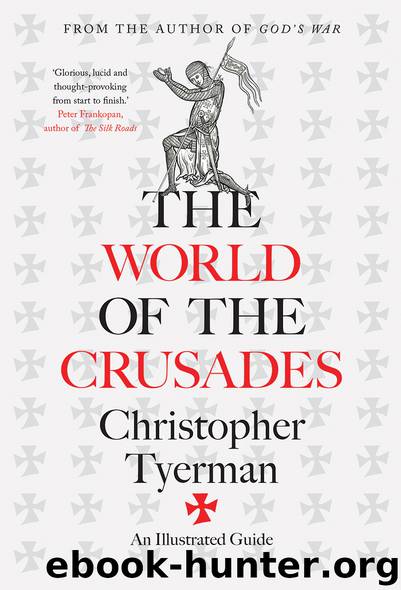The World of the Crusades by Christopher Tyerman

Author:Christopher Tyerman [Tyerman, Christopher]
Language: eng
Format: epub
ISBN: 9780300217391
Publisher: Yale University Press
Published: 0101-01-01T00:00:00+00:00
The Crusade of 1228–9
The logic of the 1221 defeat was not lost on the rulers of the rump of Outremer or planners in the west. For the former, diplomacy was as important as conflict. Antioch and Tripoli, dynastically united since 1187, became increasingly absorbed in the politics of Christian Cilician Armenia and in cutting deals with local Syrian rulers. At Acre, territory was conserved and extended largely through a rhythm of diplomacy shaped by the expiry of the recurrent truces with Ayyubid neighbours in Damascus, Transjordan and Egypt, and by playing them off against each other. The politics of Outremer were complicated by the role of Frederick II, from 1225 absentee king of Jerusalem by virtue of his marriage to the heiress Isabel II (d. 1228). While preparing to honour his crusade vows of 1215 and 1220, he conducted direct negotiations with al-Kamil over returning Jerusalem. When Frederick finally arrived in Palestine in 1228, his role had been compromised by papal excommunication for dilatoriness, the death of his wife, and the hostility of sections of the Outremer political elite, including the Cypriot Franks, Templars and Hospitallers. After military manoeuvring by both parties, Frederick and al-Kamil reached a ten-year agreement (treaty of Jaffa, February 1229) that restored Jerusalem, Bethlehem, Nazareth and all of Sidon to the Franks, although the Haram al-Sharif (Temple Mount) was left in Muslim hands, with free access for Christian pilgrims. Despite attracting opprobrium from all sides, the 1229 treaty fitted a pattern established since 1192, signalling an asymmetrical concern over the status of Palestine: Transjordan and Syria were of far greater strategic and political significance to Egypt provided the religious sensibilities of the ulema were appeased by continued control of Jerusalem’s Islamic holy places. A German poet in Frederick’s army likened the deal to watching two misers trying to divide three gold pieces equally.43
Download
This site does not store any files on its server. We only index and link to content provided by other sites. Please contact the content providers to delete copyright contents if any and email us, we'll remove relevant links or contents immediately.
| Archaeology | Essays |
| Historical Geography | Historical Maps |
| Historiography | Reference |
| Study & Teaching |
Underground: A Human History of the Worlds Beneath Our Feet by Will Hunt(12098)
Sapiens by Yuval Noah Harari(5370)
Navigation and Map Reading by K Andrew(5157)
The Sympathizer by Viet Thanh Nguyen(4390)
Barron's AP Biology by Goldberg M.S. Deborah T(4150)
5 Steps to a 5 AP U.S. History, 2010-2011 Edition (5 Steps to a 5 on the Advanced Placement Examinations Series) by Armstrong Stephen(3733)
Three Women by Lisa Taddeo(3433)
Water by Ian Miller(3185)
The Comedians: Drunks, Thieves, Scoundrels, and the History of American Comedy by Nesteroff Kliph(3079)
Drugs Unlimited by Mike Power(2594)
A Short History of Drunkenness by Forsyth Mark(2297)
DarkMarket by Misha Glenny(2212)
And the Band Played On by Randy Shilts(2209)
The House of Government by Slezkine Yuri(2206)
The Library Book by Susan Orlean(2069)
Revived (Cat Patrick) by Cat Patrick(1991)
The Woman Who Smashed Codes by Jason Fagone(1973)
The Absolutely True Diary of a Part-Time Indian by Sherman Alexie(1913)
Birth by Tina Cassidy(1904)
